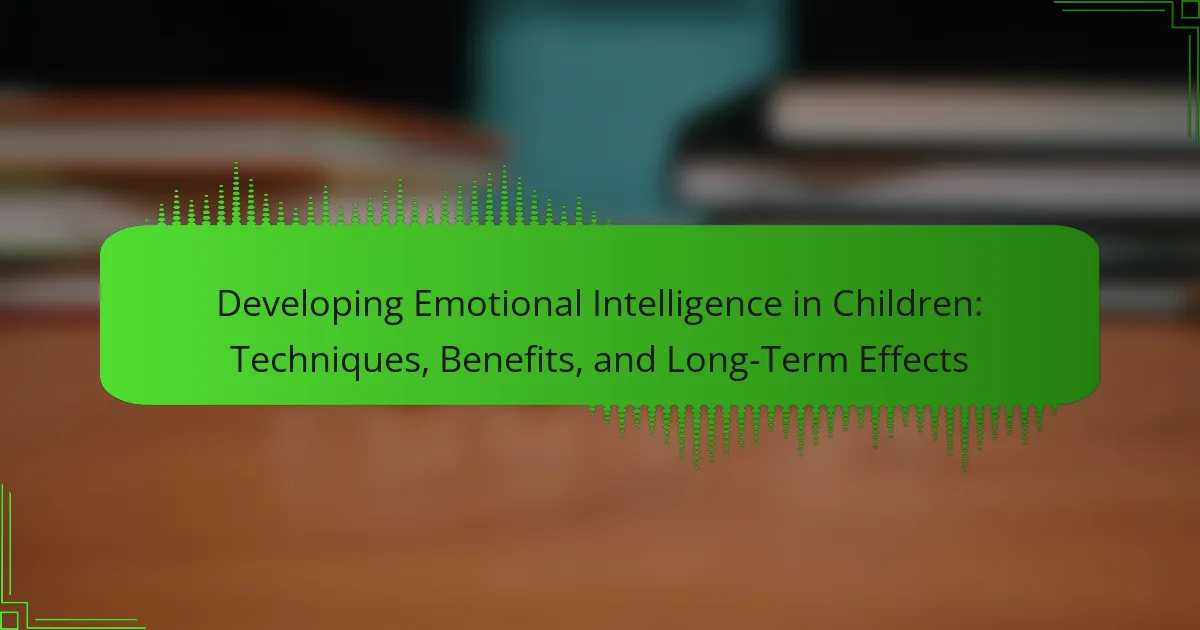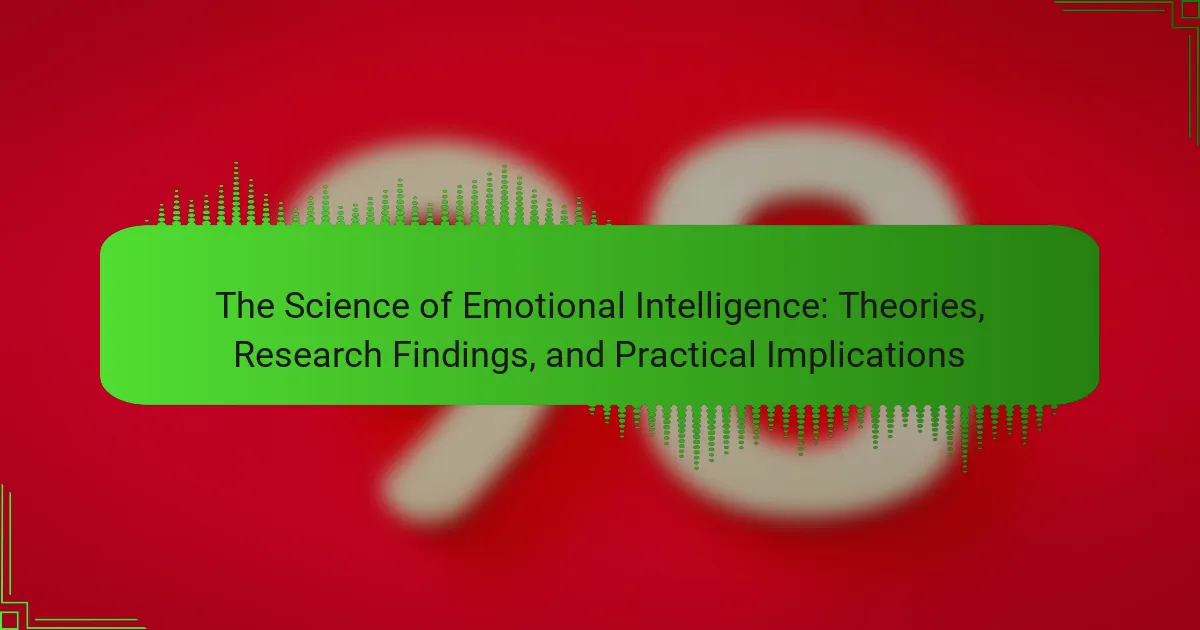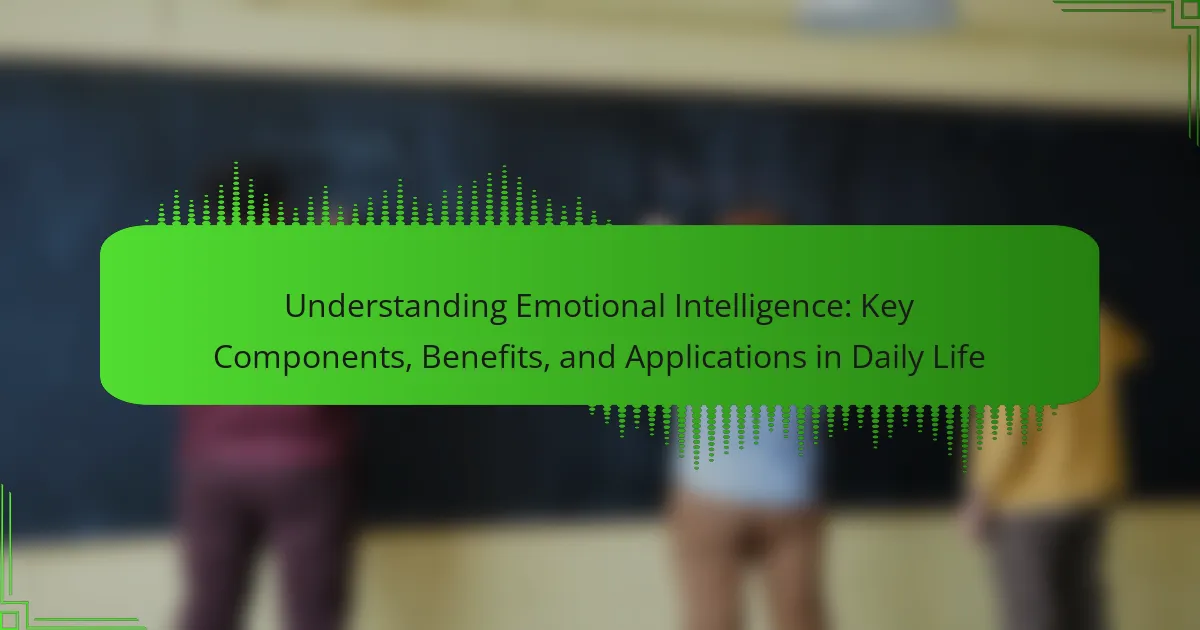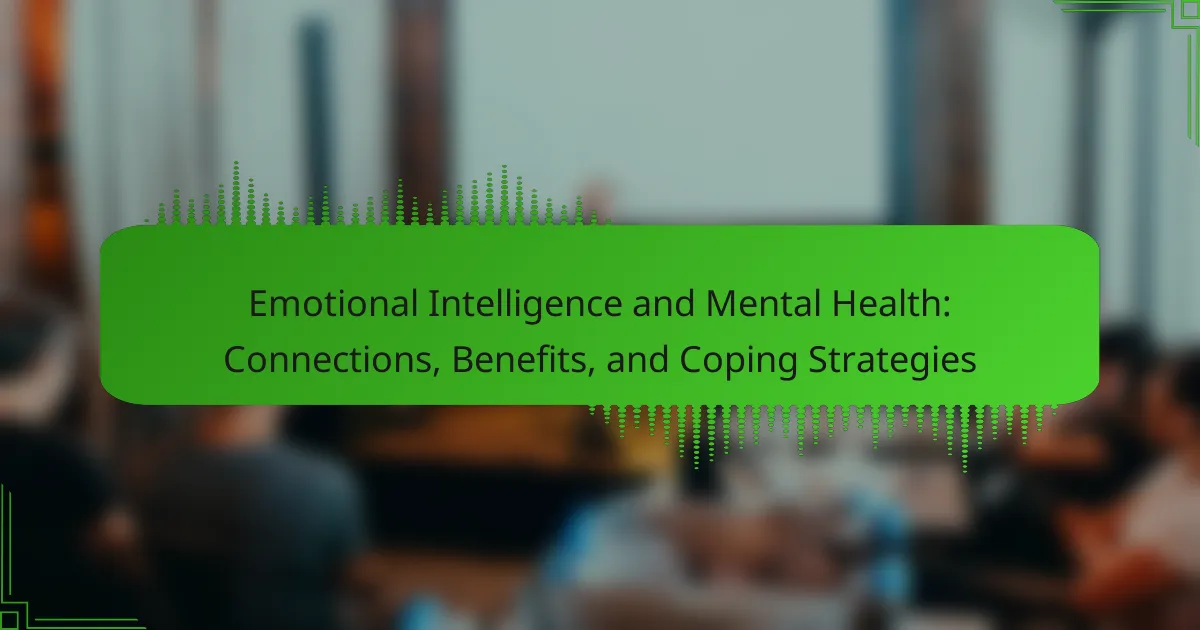Emotional intelligence in children encompasses the ability to recognize, understand, and manage both their own emotions and those of others, incorporating skills such as emotional awareness, empathy, and emotional regulation. This article explores the techniques for developing emotional intelligence, such as role-playing and teaching emotional vocabulary, highlighting their benefits including improved social skills, stronger relationships, and enhanced academic performance. Additionally, the long-term effects of high emotional intelligence are discussed, revealing connections to better mental health, resilience, and success in professional settings. Practical strategies for parents and educators to foster emotional intelligence in children are also outlined, emphasizing the importance of creating an environment that promotes emotional awareness and healthy coping mechanisms.
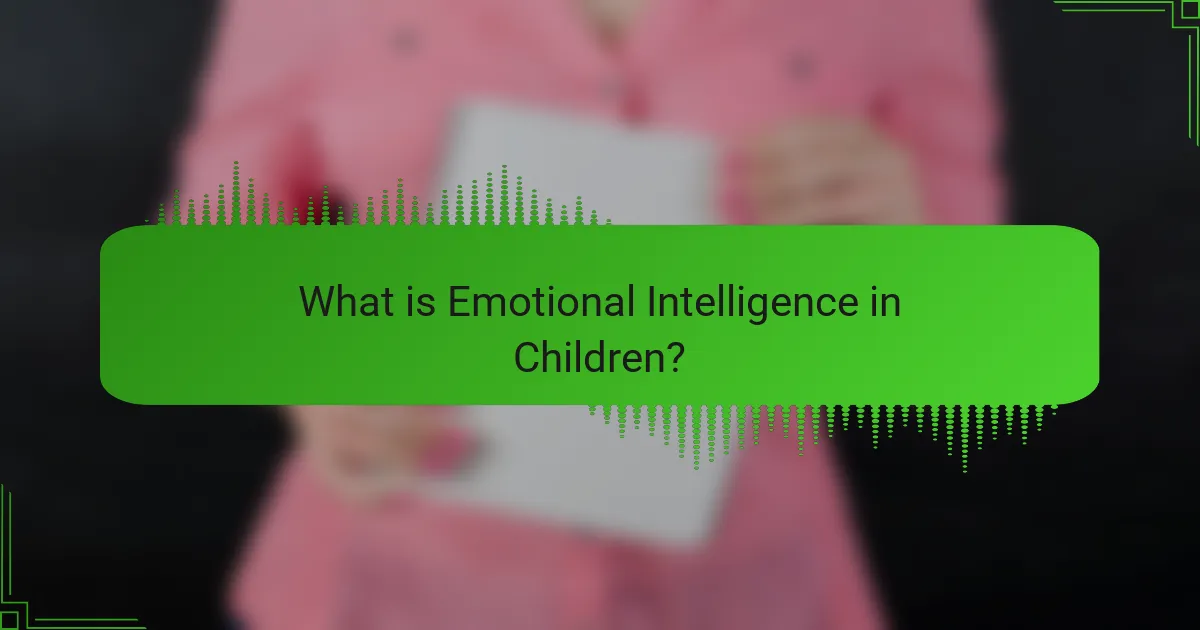
What is Emotional Intelligence in Children?
Emotional intelligence in children refers to the ability to recognize, understand, and manage their own emotions as well as the emotions of others. This skill includes emotional awareness, empathy, and emotional regulation. Research indicates that children with high emotional intelligence can better navigate social situations. They tend to have stronger relationships and improved academic performance. Studies show that emotional intelligence can be developed through specific techniques and practices. For instance, engaging in role-playing activities can enhance empathy. Additionally, teaching children to express their feelings can strengthen their emotional awareness.
How is Emotional Intelligence defined in the context of childhood development?
Emotional Intelligence in the context of childhood development is defined as the ability to recognize, understand, and manage one’s own emotions and the emotions of others. It encompasses skills such as emotional awareness, empathy, and emotional regulation. Children with high emotional intelligence can better navigate social interactions and develop healthier relationships. Research indicates that emotional intelligence contributes to academic success and overall well-being. Studies show that children with strong emotional skills often exhibit better behavior and lower levels of aggression. Additionally, fostering emotional intelligence during childhood can lead to improved mental health outcomes in adulthood.
What are the key components of Emotional Intelligence in children?
The key components of Emotional Intelligence in children are self-awareness, self-regulation, social awareness, relationship management, and motivation. Self-awareness allows children to recognize their emotions and understand how they affect their behavior. Self-regulation involves managing emotions and impulses effectively. Social awareness enables children to empathize with others and understand social cues. Relationship management includes skills for building and maintaining healthy relationships. Motivation is the drive to achieve personal goals and maintain a positive attitude. Research indicates that these components are crucial for children’s emotional and social development, influencing their academic performance and interpersonal relationships.
How does Emotional Intelligence differ from traditional intelligence?
Emotional Intelligence (EI) differs from traditional intelligence (IQ) in its focus on emotional awareness and interpersonal skills. EI encompasses the ability to recognize, understand, and manage one’s own emotions and the emotions of others. Traditional intelligence primarily measures cognitive abilities, such as reasoning, problem-solving, and academic skills. Research indicates that EI contributes significantly to personal and professional success. Studies show that individuals with high EI tend to have better relationships and improved mental health. In contrast, traditional intelligence does not account for emotional factors influencing decision-making and social interactions.
Why is developing Emotional Intelligence important for children?
Developing emotional intelligence is important for children because it enhances their social skills and emotional regulation. Children with high emotional intelligence can better understand their own emotions and those of others. This understanding leads to improved relationships with peers and adults. Furthermore, emotionally intelligent children tend to perform better academically. Studies indicate that social-emotional skills are linked to academic success. Additionally, these skills contribute to resilience in facing challenges. Emotional intelligence also fosters empathy, which is crucial for conflict resolution. Overall, nurturing emotional intelligence equips children with essential life skills for their future.
What are the short-term benefits of Emotional Intelligence in children?
Short-term benefits of emotional intelligence in children include improved social skills and better communication. These children can recognize and express their emotions effectively. They often experience reduced anxiety and stress levels. Emotional intelligence helps them resolve conflicts more amicably. Research shows that children with high emotional intelligence perform better academically. They are more adaptable in social situations. Studies indicate that such children exhibit greater empathy towards peers. This leads to stronger friendships and support systems.
How does Emotional Intelligence impact children’s social skills?
Emotional intelligence significantly enhances children’s social skills. It enables children to understand and manage their emotions effectively. This understanding fosters empathy, allowing them to relate to others’ feelings. As a result, children with high emotional intelligence communicate more effectively. They are better at resolving conflicts and building relationships. Research shows that children with strong emotional intelligence demonstrate better social interactions. A study by Brackett et al. (2013) found that emotional intelligence correlates with positive social behavior in children. Thus, emotional intelligence plays a crucial role in developing essential social skills.
What techniques can be used to develop Emotional Intelligence in children?
Techniques to develop Emotional Intelligence in children include modeling emotional awareness, teaching empathy, and fostering communication skills. Parents and educators can model emotional awareness by expressing their feelings openly. This creates a safe space for children to explore their own emotions. Teaching empathy involves discussing feelings and encouraging children to consider others’ perspectives. Activities like role-playing can enhance this understanding. Fostering communication skills includes encouraging children to express their emotions verbally. This can be done through storytelling or discussions about feelings. Research indicates that these techniques can lead to improved social skills and better emotional regulation in children.
How can parents foster Emotional Intelligence at home?
Parents can foster emotional intelligence at home by modeling emotional awareness and regulation. They should express their own emotions openly and discuss them. This teaches children to recognize and name their feelings. Engaging in active listening during conversations is crucial. Parents can ask open-ended questions to encourage children to express their thoughts. Role-playing different scenarios can also help children understand various emotional responses. Providing a safe space for children to share their feelings promotes trust. Research indicates that children with high emotional intelligence perform better academically and socially. Developing these skills early can lead to lifelong benefits in relationships and mental health.
What role do schools play in promoting Emotional Intelligence?
Schools play a crucial role in promoting Emotional Intelligence (EI) among students. They create structured environments where emotional skills can be taught and practiced. Programs focused on social-emotional learning (SEL) are implemented in many schools. These programs help students recognize and manage their emotions. They also teach empathy, relationship skills, and responsible decision-making. Research shows that schools with SEL curricula see improved academic performance and reduced behavioral issues. For example, a meta-analysis by Durlak et al. (2011) found that SEL programs improved students’ social and emotional skills by 23%. Schools provide a unique setting for students to develop EI through peer interactions and teacher guidance. This foundational development supports lifelong emotional and social competencies.
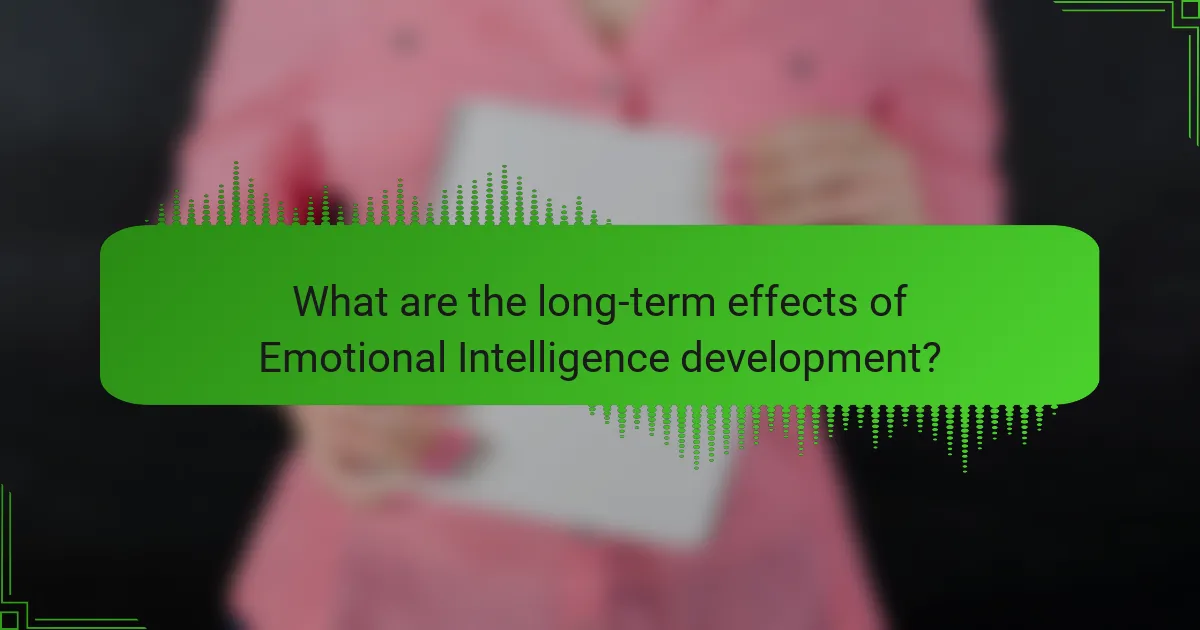
What are the long-term effects of Emotional Intelligence development?
The long-term effects of Emotional Intelligence (EI) development include improved interpersonal relationships, enhanced mental health, and better academic and professional success. Individuals with high EI can effectively manage stress and resolve conflicts. They demonstrate greater empathy and understanding toward others, fostering stronger social connections. Research shows that emotionally intelligent individuals are more resilient in facing life challenges. Studies indicate that EI is linked to higher job performance and leadership capabilities. For example, a study by Cherniss and Goleman found that EI contributes significantly to workplace success. Additionally, emotionally intelligent individuals often experience lower rates of anxiety and depression over time.
How does Emotional Intelligence influence future academic success?
Emotional Intelligence (EI) significantly influences future academic success. EI encompasses skills such as self-awareness, self-regulation, social skills, empathy, and motivation. Students with high EI tend to manage stress better, leading to improved focus and academic performance. Research shows that students with higher EI achieve better grades and have lower dropout rates. A study by Mayer, Salovey, and Caruso (2004) indicates that EI correlates positively with academic achievement. Additionally, EI enhances collaborative skills, fostering better relationships with peers and teachers, which further supports learning. Therefore, the development of Emotional Intelligence in children is crucial for their long-term academic success.
What evidence supports the link between Emotional Intelligence and academic performance?
Emotional Intelligence (EI) positively influences academic performance. Research indicates that students with higher EI tend to achieve better grades. A study by Parker et al. (2004) found that EI correlates with academic success in adolescents. Another research by Brackett et al. (2011) showed that EI contributes to improved classroom behavior and engagement. This engagement leads to enhanced learning outcomes. Additionally, a meta-analysis by Perera and DiGiacomo (2013) confirmed a significant relationship between EI and academic achievement across various educational settings. These findings consistently highlight the importance of EI in fostering better academic performance among students.
How does Emotional Intelligence contribute to career success in adulthood?
Emotional Intelligence (EI) significantly contributes to career success in adulthood. EI enhances interpersonal skills, enabling effective communication and collaboration. Individuals with high EI can manage stress and adapt to changing environments. This adaptability leads to better problem-solving and decision-making abilities. Moreover, EI fosters strong leadership qualities, as emotionally intelligent individuals inspire and motivate others. Research indicates that 90% of top performers possess high EI, highlighting its importance in professional settings. Organizations often prioritize EI in hiring and promotion processes, recognizing its role in workplace success.
What are the impacts of Emotional Intelligence on mental health over time?
Emotional Intelligence (EI) positively impacts mental health over time. Individuals with high EI tend to manage stress better. They exhibit lower levels of anxiety and depression. Research shows that EI contributes to better coping strategies. A study by Schutte et al. (2002) found that higher EI correlates with improved psychological well-being. Over time, this can lead to enhanced resilience. Resilience helps individuals navigate life’s challenges effectively. As a result, individuals with high EI often experience sustained mental health benefits.
How does Emotional Intelligence relate to resilience in challenging situations?
Emotional Intelligence (EI) enhances resilience in challenging situations. EI involves recognizing, understanding, and managing emotions. Individuals with high EI can better cope with stress and adversity. This ability enables them to remain calm and focused during difficulties. Studies show that people with high EI are more adaptable. They can analyze situations and respond effectively. Emotional regulation, a key aspect of EI, prevents overwhelming feelings. Research indicates that EI is linked to better problem-solving skills. This connection supports resilience by promoting a proactive approach to challenges.
What role does Emotional Intelligence play in interpersonal relationships as adults?
Emotional Intelligence (EI) significantly enhances interpersonal relationships among adults. EI enables individuals to recognize and manage their own emotions as well as the emotions of others. This skill fosters effective communication and empathy. Adults with high EI can navigate social complexities more adeptly. Research indicates that strong EI correlates with better conflict resolution and collaboration. A study by Brackett et al. (2011) found that individuals with higher EI experience more satisfying relationships. Thus, EI plays a crucial role in building and maintaining healthy [censured] relationships.
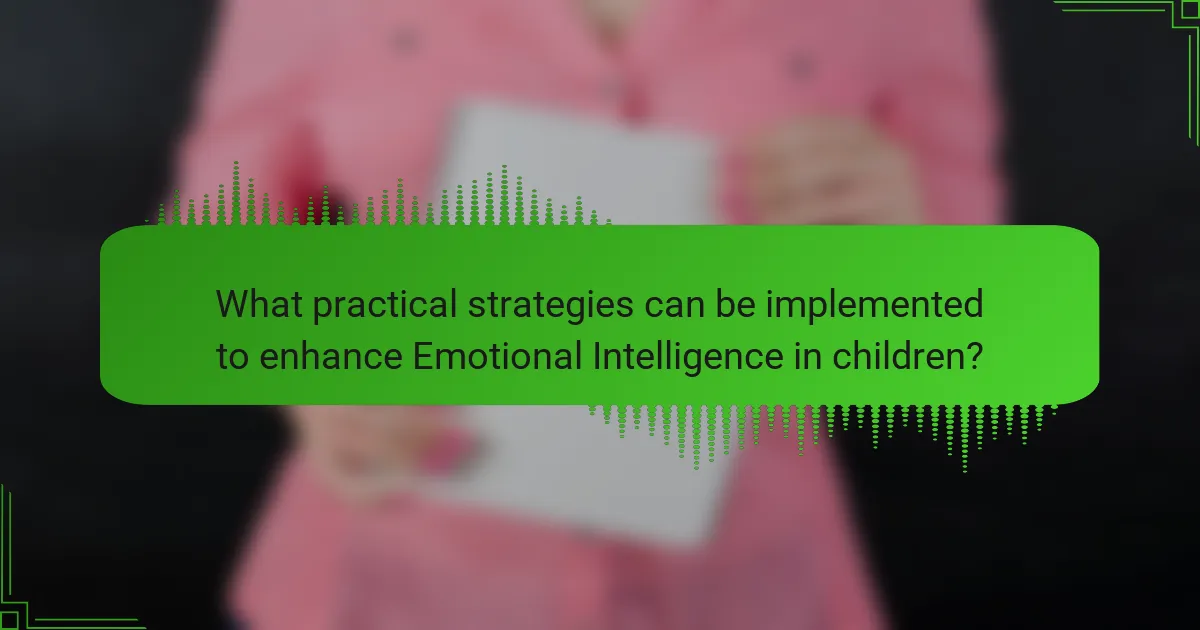
What practical strategies can be implemented to enhance Emotional Intelligence in children?
Practical strategies to enhance Emotional Intelligence in children include teaching emotional vocabulary. Children should learn to identify and label their emotions accurately. Role-playing scenarios can help children practice empathy and perspective-taking. Encouraging open discussions about feelings fosters an environment of emotional awareness. Parents and educators can model emotional regulation by demonstrating healthy coping strategies. Mindfulness activities, such as deep breathing, can improve self-awareness and emotional control. Regularly engaging in cooperative play teaches teamwork and conflict resolution skills. Research indicates that these strategies can lead to improved social skills and academic performance in children.
How can mindfulness practices improve Emotional Intelligence in children?
Mindfulness practices can significantly enhance Emotional Intelligence (EI) in children. These practices help children develop self-awareness by encouraging them to recognize their thoughts and feelings. Increased self-awareness leads to better emotional regulation. Children learn to manage their emotions, reducing impulsivity and enhancing their ability to respond to situations thoughtfully. Mindfulness also fosters empathy by promoting an understanding of others’ feelings. Research indicates that mindfulness training can lead to improved social skills and better relationships. A study published in the journal “Child Development” found that children who practiced mindfulness showed higher levels of EI compared to those who did not. This connection between mindfulness and EI is supported by evidence that mindfulness practices improve attention and focus, which are essential for emotional understanding.
What specific activities can parents and educators use to teach Emotional Intelligence?
Parents and educators can use various activities to teach Emotional Intelligence. Role-playing scenarios help children practice empathy and recognize emotions. Storytelling encourages discussions about feelings and moral dilemmas. Journaling allows children to reflect on their emotions and experiences. Group activities promote teamwork and communication skills. Mindfulness exercises teach self-regulation and awareness of emotions. Art projects provide a creative outlet for expressing feelings. Games that involve sharing and cooperation foster social skills. These activities are supported by research indicating that experiential learning enhances emotional understanding.
What common challenges arise when developing Emotional Intelligence in children?
Common challenges in developing Emotional Intelligence in children include lack of awareness, difficulty in expressing feelings, and limited empathy. Children often struggle to recognize their own emotions. This can hinder their ability to communicate feelings effectively. Additionally, some children may find it challenging to understand others’ emotions. This lack of empathy can create social difficulties. Furthermore, inconsistent parenting styles can confuse children about emotional responses. Lastly, societal influences may undervalue emotional skills, leading to neglect in their development. These factors collectively complicate the process of nurturing Emotional Intelligence in children.
How can these challenges be effectively addressed?
Challenges in developing emotional intelligence in children can be effectively addressed through targeted techniques. Implementing social-emotional learning (SEL) programs in schools fosters emotional awareness. These programs include activities that promote empathy, self-regulation, and interpersonal skills. Engaging parents in workshops enhances understanding of emotional intelligence at home. Role-playing scenarios allows children to practice emotional responses in a safe environment. Regular feedback helps children recognize their emotional progress. Research shows that SEL programs lead to improved academic performance and reduced behavioral issues. According to a meta-analysis by Durlak et al. (2011), students participating in SEL programs demonstrated significant improvements in social and emotional skills.
Developing Emotional Intelligence (EI) in children refers to the ability to recognize, understand, and manage their own emotions and the emotions of others. The article covers key components of EI, including self-awareness, empathy, and emotional regulation, and discusses the importance of nurturing these skills for improved social interactions, academic performance, and mental health. It outlines practical techniques for fostering EI at home and in schools, highlights the short-term and long-term benefits of EI development, and addresses common challenges faced in this process. Research findings supporting the connection between EI and various outcomes, such as resilience and career success, are also presented.
